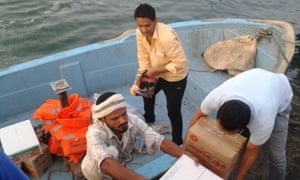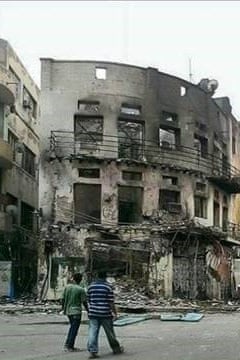Read all the contributions here
Date: Tue, 9 Jun 2015 00:08:08 +0200
As violence continues in Yemen, those caught up in the conflict shared their stories via GuardianWitness

The humanitarian crisis in Yemen has been described as “catastrophic” by the UN, with 80% of the population in need of aid. As the violence escalates, those caught up in the conflict share stories of living in constant fear of bombardment, with little access to food and water.
Doa’a Kutbi Omer, public health officer, International Medical Corps, Attouahi, Aden
“Snipers had already taken up positions in the neighbourhood and the area was besieged. Everything moved so fast. We just ran. We saw people on boats screaming as they realised they were being shot at; some of them were neighbours and friends.”
Nasr Al-Rega-ey, English teacher, Khormaksar district
“I remembered the joy of this place just few months ago, suddenly all of that disappeared. Almost two months and we are still suffering, no salaries, not enough food, no electricity and almost no water. We don’t know what is next but we know that we are alone in this situation.”
Mahmood Shamsan
“I woke up in morning, took out gas cylinder and went to stand in a long queue from 11am to 5.15pm. After that I came home to go shopping, but I didn’t find anything. We didn’t find water for two weeks.”
Ghada S Al Attar
“The whole country is fighting except Sana’a, who silently accepted the Houthis power over the Yemeni political situation. People stand for hours to get bread to feed their hungry children, and the refugees who ran from their burning houses to stay with their relatives search not for safety, but for a roof to protect them from the sun and daily rain of bullets and missiles.”
Hep Ko
“I heard a frightening sound of a plane, followed by a huge explosion. I realised later it was an attack on the palace in Aden, and the real start of the darkness that still covers my city. I have moved from my home in Crater; I’m displaced. Though where I am now there is food and water, some electricity and Internet, I still can’t act or live as a normal girl.”
Sami Jassar, Islamic Relief
“There is no place in Sana’a that is considered safe. Everything is in a state of paralysis. It looks like a ghost town. There are no aeroplanes coming through the airport since the conflict started and the fuel shortages mean that we are often in darkness for days on end.”
Dr Rasha Al-Ardi, Unicef aid worker, Hodeidah
“The situation is changing very quickly; it is not safe to let my children leave home. We are sleeping with the sounds of bombings and anti-aircraft machine guns. I feel that our children have grown up suddenly. They are talking about what is happening in the country instead of talking about their toys and school. Rapid deterioration of the situation is also affecting our response to the humanitarian need.”

Jawareh’s story
Jawareh is a seven-year-old refugee at Al Rahma temporary transit centre in Obock region, Djibouti. “I was playing and I saw a plane that left fire behind. Then I heard the bombs. I was so scared that I went running to my mum and we all went out of the house.”
Ansar, Unicef aid worker
“I go to sleep with the sound of bombs crashing over my head, the walls of my room shaking from the massive explosions. I see mothers screaming, desperate to feed their starving children. I see empty streets, devoid of children’s laughter. The conflict has had a great impact on all of us, but the children are always the ones hardest hit.”
Mohammed, Unicef aid worker
“At night, I hear the jet fighters rattling the sky and the bombs falling. During the day, I see armed men on pickup trucks dashing about the city. But I also see families with children out in the streets, looking confused and unable to comprehend the unfolding situation. The bombardment of Aden has intensified over the past few days and there is more fighting in the streets. This time, the whole country seems to be engulfed by fighting.”
Sarrah’s story
Sarrah is an 11-year-old refugee in a temporary transit centre in Obock. Her family hope to get a visa to Egypt, where they lived before moving to Yemen two years ago. “I grew up in Egypt. My first school was there, my friends are there. I just want to go back.”
Halima’s story
Adbou Amis and his family fled from Mayoun to Obock in a fishing boat carrying 15 people, including his 18-month-old daughter Halima, who suffers from a neurological condition. “We were so frightened. My wife and baby kept crying. We had no choice but to leave.”
Read all the contributions here.